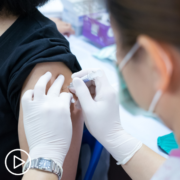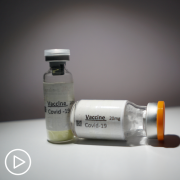Is the COVID-19 Vaccine Safe and Effective for AML Patients?
Is the COVID-19 Vaccine Safe and Effective for AML Patients? from Patient Empowerment Network on Vimeo.
What should acute myeloid leukemia (AML) patients know about COVID-19 vaccines? Expert Dr. Ellen Ritchie shares information about COVID-19 vaccine safety and effectiveness for AML patients and reviews side effects that may follow vaccination.
Dr. Ellen K. Ritchie is assistant professor of medicine and a member of the Leukemia Program at the Weill Cornell Medical College of Cornell University and the New York Presbyterian Hospital. More about Dr. Ritchie, here.
Related Resources:

|

|

|
Transcript:
Katherine:
The second question is from Craig, he says, “I’m currently undergoing treatment for AML. Is the COVID-19 vaccine safe and effective?”
Dr. Ritchie:
I recommend the COVID-19 vaccine to everyone, all my patients. A little immunity is better than none. And there is preliminary data, looking at patients with myeloid malignancies, not lymphoid, but myeloid malignancies, where it appears there is an immune response to the COVID-19 vaccine. So, I would suggest that you get the COVID-19 vaccine. Any of them that are available, are good. Whether it’s Moderna, or Pfizer, or Johnson & Johnson. Whatever is available to you, you should go ahead and get.
Katherine:
Are there any symptoms or issues that AML patients should be looking for post-vaccine?
Dr. Ritchie:
Post-vaccine, there’s a lot of symptoms that people have. And they can be similar among myeloid patients. Some of my patients have had no reaction whatsoever, some people have had a really sore arm.
Some patients are incredibly tired after the vaccine; some patients develop a low-grade fever for a couple of days. Those are really what we watch for. Sometimes when there’s a reaction, we’re hopeful that there’s an antibody being made, or an immune response that’s developing. So, it’s not always a bad thing if you have a reaction. But I don’t think that the reactions of patients of myeloid malignancies is any different than that of the general public.



